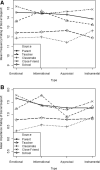Perceived social support and its association with obesity-specific health-related quality of life
- PMID: 21263350
- PMCID: PMC3480181
- DOI: 10.1097/DBP.0b013e318208f576
Perceived social support and its association with obesity-specific health-related quality of life
Abstract
Objective: To (1) describe type and source of social support perceived by obese youth and examine associations with sociodemographic/anthropometric characteristics, and (2) examine relationships between social support and obesity-specific health-related quality of life (HRQOL).
Methods: Seventy-four obese youth and their primary caregivers participated. Youth completed the Child and Adolescent Social Support Scale and an obesity-specific HRQOL measure, Sizing Me Up.
Results: Close friends and parents provided the most social support and were rated most important, except for teacher informational support. Classmates and schools provided the least social support. Body mass index z-score was correlated with teacher support frequency (r = -.26, p < .05) and minority youth reported more parent support (t(72) = -2.21, p < .05). Compared with other support providers, classmate support significantly predicted most HRQOL scales (p < .001).
Conclusions: Close friends, parents, and teachers are significant sources of support to youth with obesity; however, classmates play a unique role in the HRQOL of obese youth.
Figures
References
-
- Centers for Disease Control and Prevention [Accessed October 7, 2009];Childhood overweight and obesity. http://www.cdc.gov/obesity/childhood/index.html.
-
- Zeller MH, Modi AC. Predictors of health-related quality of life in obese youth. Obesity. 2006;14:122–130. - PubMed
-
- Tardy C. Social support measurement. Am J Community Psychol. 1985;13:187–202.
-
- Mellin AE, Neumark-Sztainer D, Story M, Ireland M, Resnick MD. Unhealthy behaviors and psychosocial difficulties among overweight adolescents: the potential impact of familial factors. J Adolesc Health. 2002;31:145–153. - PubMed
-
- Ostrander R, Weinfurt KP, Nay WR. The role of age, family support, and negative cognitions in the prediction of depressive symptoms. School Psych Rev. 1998;27:121.
Publication types
MeSH terms
Grants and funding
LinkOut - more resources
Full Text Sources
Medical


